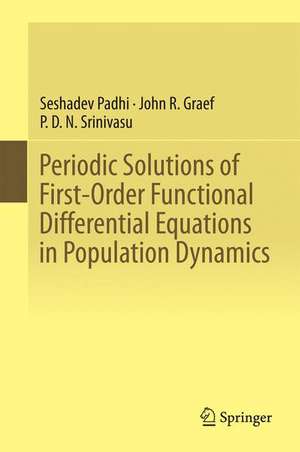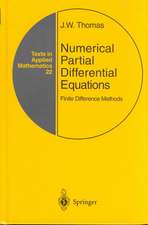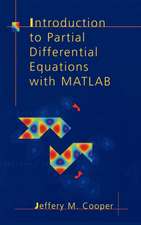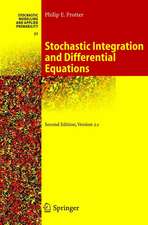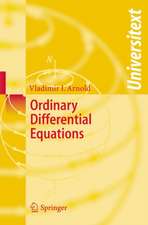Periodic Solutions of First-Order Functional Differential Equations in Population Dynamics
Autor Seshadev Padhi, John R. Graef, P. D. N. Srinivasuen Limba Engleză Hardback – 22 mai 2014
| Toate formatele și edițiile | Preț | Express |
|---|---|---|
| Paperback (1) | 380.25 lei 6-8 săpt. | |
| Springer India – 27 sep 2016 | 380.25 lei 6-8 săpt. | |
| Hardback (1) | 387.58 lei 6-8 săpt. | |
| Springer India – 22 mai 2014 | 387.58 lei 6-8 săpt. |
Preț: 387.58 lei
Nou
Puncte Express: 581
Preț estimativ în valută:
74.17€ • 77.15$ • 61.23£
74.17€ • 77.15$ • 61.23£
Carte tipărită la comandă
Livrare economică 14-28 aprilie
Preluare comenzi: 021 569.72.76
Specificații
ISBN-13: 9788132218944
ISBN-10: 8132218949
Pagini: 198
Ilustrații: XIV, 144 p. 8 illus.
Dimensiuni: 155 x 235 x 15 mm
Greutate: 0.4 kg
Ediția:2014
Editura: Springer India
Colecția Springer
Locul publicării:New Delhi, India
ISBN-10: 8132218949
Pagini: 198
Ilustrații: XIV, 144 p. 8 illus.
Dimensiuni: 155 x 235 x 15 mm
Greutate: 0.4 kg
Ediția:2014
Editura: Springer India
Colecția Springer
Locul publicării:New Delhi, India
Public țintă
ResearchCuprins
Chapter 1. Introduction.- Chapter 2. Positive Periodic Solutions of Nonlinear Functional Differential Equations with Parameter λ.- Chapter 3. Multiple Periodic Solutions of a System of Functional Differential Equations.- Chapter 4. Multiple Periodic Solutions of Nonlinear Functional Differential Equations.- Chapter 5. Asymptotic Behavior of Periodic Solutions of Differential Equations of First Order.- Bibliography.
Recenzii
“This book presents various results on the existence and stability of periodic solutions for first order scalar functional differential equations. … This book is written in a clear and concise style and offers a valuable reference guide for students and researchers interested in the study of periodic solutions for functional differential equations.” (Adriana Buică, zbMATH 1312.34002, 2015)
Notă biografică
Seshadev Padhi is associate professor of mathematics at Birla Institute of Technology, Mesra, Ranchi, Jharkhand, India. He received his PhD on the topic on “oscillation theory of third order differential equations”. He was awarded with the BOYSCAST (Better Opportunities for Young Scientists in Chosen Areas of Science and Technology) fellow by the Department of Science and Technology (DST), Government of India in 2004 to visit Mississippi State Univerisity, USA. Subsequently, Dr. Padhi did his post-doctoral work in Mississippi State University, USA. In addition, Dr. Padhi visited several Institutes of international repute: Florida Institute of Technology, Melbourna, Florida USA to work in Collaboration with Prof. T. Gnanabhakar in 2006; Texas State University at San Marcos, Texas, USA to work in collaboration with Prof. Julio G.Dix, in 2009; University of Tennessee at Chattanooga, Chattanooga, Tennessee, USA in 2011, 2012 and 2013 to work in collaboration with Prof. John R. Graef; University of Szeged, Szeged, Hungary in 2007 and 2011 to work in collaboration with Prof. Tibor Krisztin. Besides, he also visited ETH, Zurich, Switzerland under Borel Set Theory Programme in 2005, and also several countries to deliver lectures in different international conferences and workshops. Dr. Padhi got UNESCO travel and lodging grant to visit ICTP, Trieste, Italy in the year 2003. Dr. Padhi has published more than sixty research papers in international journals of repute. He has been working as referee for more than 30 international journals and a reviewer of Mathematical Review since 2006.
John R. Graef is professor of mathematics at The University of Tennessee at Chattanooga. His research interests include ordinary and functional differential equations, difference equations, impulsive systems, differential inclusions, dynamic equations on time scales, fractional differential equations, and their applications. His special interests are in nonlinear oscillations, stability and other asymptotic properties of solutions, boundary value problems, and applications to biological systems. He has published more than 350 papers and authored or edited five books.
P.D.N. Srinivasu is professor of mathematics at Andhra University, Visakhapatnam, India. He obtained his PhD in 1992 from Sri Sathya Sai Institute of Higher Learning, India, on the topic “Existential and numerical study of implicit differential equations”. His research interests include mathematical modelling, population dynamics, mathematical bio-economics and optimal control. He visited several academic institutes of international repute to deliver invited lectures and participate in conferences and workshops. Prof. Srinivasu visited The International Centre for Theoretical Physics (ICTP), Trieste, Italy, many times as a visiting scientist, in addition to The Beijer International Institute of Ecological Economics, Royal Swedish Academy of Sciences, Stockholm, Sweden; Eidgenossische Technische Hochschule ( ETH), Zurich; and the University of Zurich, Switzerland. Besides working as a reviewer for many internationally journals, Prof. Srinivasu has many research papers to his credit in several journals of repute.
John R. Graef is professor of mathematics at The University of Tennessee at Chattanooga. His research interests include ordinary and functional differential equations, difference equations, impulsive systems, differential inclusions, dynamic equations on time scales, fractional differential equations, and their applications. His special interests are in nonlinear oscillations, stability and other asymptotic properties of solutions, boundary value problems, and applications to biological systems. He has published more than 350 papers and authored or edited five books.
P.D.N. Srinivasu is professor of mathematics at Andhra University, Visakhapatnam, India. He obtained his PhD in 1992 from Sri Sathya Sai Institute of Higher Learning, India, on the topic “Existential and numerical study of implicit differential equations”. His research interests include mathematical modelling, population dynamics, mathematical bio-economics and optimal control. He visited several academic institutes of international repute to deliver invited lectures and participate in conferences and workshops. Prof. Srinivasu visited The International Centre for Theoretical Physics (ICTP), Trieste, Italy, many times as a visiting scientist, in addition to The Beijer International Institute of Ecological Economics, Royal Swedish Academy of Sciences, Stockholm, Sweden; Eidgenossische Technische Hochschule ( ETH), Zurich; and the University of Zurich, Switzerland. Besides working as a reviewer for many internationally journals, Prof. Srinivasu has many research papers to his credit in several journals of repute.
Textul de pe ultima copertă
This book provides cutting-edge results on the existence of multiple positive periodic solutions of first-order functional differential equations. It demonstrates how the Leggett-Williams fixed-point theorem can be applied to study the existence of two or three positive periodic solutions of functional differential equations with real-world applications, particularly with regard to the Lasota-Wazewska model, the Hematopoiesis model, the Nicholsons Blowflies model, and some models with Allee effects. Many interesting sufficient conditions are given for the dynamics that include nonlinear characteristics exhibited by population models. The last chapter provides results related to the global appeal of solutions to the models considered in the earlier chapters. The techniques used in this book can be easily understood by anyone with a basic knowledge of analysis. This book offers a valuable reference guide for students and researchers in the field of differential equations with applications to biology, ecology, and the environment.
Caracteristici
Introduces the existence of multiple positive periodic solutions to first-order functional differential equations with real-world applications Demonstrates how the Leggett-Williams fixed-point theorem can be applied to study the existence of two or three positive periodic solutions of functional differential equations Discusses sufficient conditions for dynamics equations that include nonlinear characteristics exhibited by population models Includes supplementary material: sn.pub/extras
